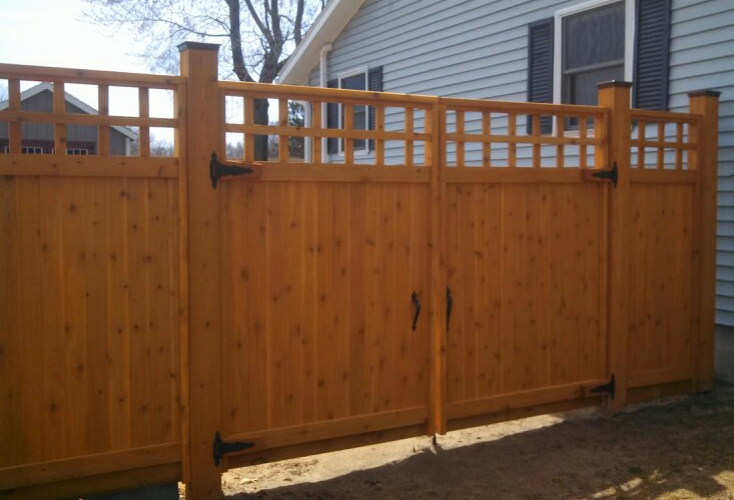All Categories
Featured

When planning to install a fence around your building, one of the first steps is understanding the permitting requirements in your area. Below's what you need to recognize concerning obtaining the required permits for your fence installation.
Why Do You Required a License for a Fencing? An authorization is typically required for fence installments to make sure compliance with regional structure codes, zoning regulations, and safety and security laws. Allowing helps regional authorities preserve uniformity in area aesthetic appeals, safety and security, and ecological factors to consider. It likewise makes certain that the fencing does not conflict with utility lines or public areas, which it abides by elevation and limit limitations.

Common Authorizations Required for Fencing Installment. Building Authorization. Most areas require a structure license for fencing installation, specifically if the fence goes beyond a specific elevation (generally over 6 feet) or is made from non-standard products. This authorization makes certain that your fence follows local building codes. In some areas, the building department will certainly evaluate the site to ensure that the fence fulfills security and structural requirements.
Zoning License. Zoning licenses are designed to ensure that your fence abides by local zoning legislations, consisting of troubles from residential property lines, easements, and rights-of-way. Zoning regulations differ from city to city, and in many cases, your fencing may need to be set back a particular number of feet from the sidewalk or roadway. If your fence is in a historical district or various other specially assigned locations., a zoning license might additionally be necessary.

Fencing License. In some places, a particular "fence permit" might be required. This is generally needed when developing a fence for houses. The local federal government might specify the height, material, and style of the fencing to ensure it blends well with the surrounding area. For instance, some cities limit chain-link fencings in front lawns or have details guidelines for personal privacy fencings.
HOA Approval. If your home is component of a home owners organization (HOA), you might need authorization before mounting a fence. HOA standards usually consist of details policies concerning the type, elevation, color, and products for fencings to maintain the community's appearances. HOA laws can be stricter than city codes, so always examine their guidelines before progressing.
Easement or Utility Permits. If your fencing will be near or across an easement (such as an utility easement), you might require to obtain approval from the energy business or various other entities that regulate the land. This is especially important if you prepare to mine fence posts, as it guarantees you will not harm underground energies like water, power, or gas lines.
Just How to Learn What Permits Are Called for. The most effective means to figure out which permits are needed for your fence setup is to contact your regional building division or local workplace. They can provide you with details info concerning requirements in your location. Below are a couple of steps you can require to learn:
Inspect the City or Area Website: Lots of local federal governments provide details regarding fencing setup allows online. Look for structure or zoning areas on their web site. Call or Check Out Local Federal Government Workplaces: If the info is not conveniently available online, calling or seeing the regional workplace face to face can clarify what's required. Speak With a Specialist Service Provider: If you're unclear or overloaded by the procedure, a local service provider or fencing installment business can assist in browsing the permitting process, as they're familiar with regional policies. What Happens If You Do Not Obtain a License? Falling short to obtain the needed permits can cause a selection of repercussions. In many areas, you can encounter fines, and your fence could be purchased to be removed. In addition, if you offer your residential or commercial property in the future, the lack of proper licenses might be a warning for buyers and impact the sale. Permitting ensures that your fence is compliant and assists stay clear of future difficulties.
Final thought. Before installing a fencing around your residential property, it's necessary to inspect whether a license is needed in your location. Structure permits, zoning authorizations, HOA authorization, and utility consents might all play a duty in your fencing installation procedure. Putting in the time to research and acquire the essential permits will not only ensure that you're complying with regional guidelines, yet likewise help shield your investment and keep the integrity of your building.
Latest Posts
Laminate Flooring: Style Fulfills Sturdiness at Carpet Interiors Floor & Home
Published Apr 20, 25
2 min read
Classy, Durable Tile Floor Covering for every single Area
Published Apr 20, 25
1 min read
Transform Your Home with Sturdy Wood Floor Covering from Carpet Interiors Floor & Home
Published Apr 20, 25
1 min read
More
Latest Posts
Laminate Flooring: Style Fulfills Sturdiness at Carpet Interiors Floor & Home
Published Apr 20, 25
2 min read
Classy, Durable Tile Floor Covering for every single Area
Published Apr 20, 25
1 min read
Transform Your Home with Sturdy Wood Floor Covering from Carpet Interiors Floor & Home
Published Apr 20, 25
1 min read